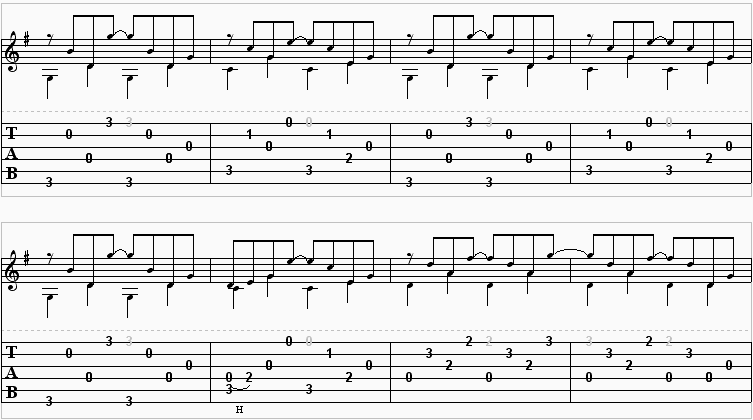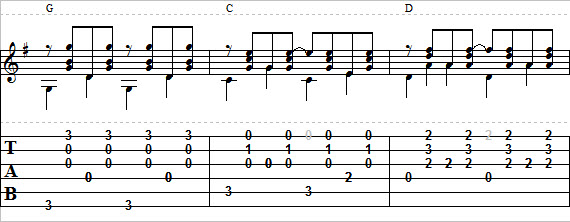Verse Riff
Use fingerpicking to play this one.

Transposing Leaving On A Jet Plane
You can change Leaving On A Jet Plane to the following keys by placing the capo on these frets:
- 1st fret = G#
- 2nd fret= A
- 3rd fret= A#
- 4th fret= B
- 5th fret= C
- 6th fret= C#
- 7th fret= D
- 8th fret= D#
- 9th fret= E
We’re getting pretty high up on the fretboard at this point and using a capo on a fret any higher becomes very unpractical as you won’t have much room to fret full chords. You should be able to find a suitable key by using one of these options.e
If you’re performing the song with other musicians, you may want to stick to primary keys to make things easier for everyone. That means you’ll want to avoid sharps or flats. Just stick to A, B, C, D, E, or F.
Riff Resources
Complete Transcription To “Leaving On A Jet Plane” (PDF)
Complete Transcription To “Leaving On A Jet Plane” (Power Tab)
In this song study of “Leaving On A Jet Plane” by John Denver, I’ll present you with different ways to approach and play the song. That’s the ultimate goal of this song study! Not only do I want you to be able to perform the song, but I want you to understand the theory behind the song, as well.
We’ll cover everything you could want to know about the song. We’ll learn the chords, the chord progression, the strumming pattern, the lyrics, how to sing it, and how to play the original guitar parts note for note.
In the video below you can listen to the song’s original recording and view the lyrics and chord changes. It’s a great way to prepare yourself for learning to play the song on your own:
Easy Strumming Only Version
The easiest way to play the song is to take the basic chord progression and add a basic strumming pattern. I’ll first introduce you to the chords and chord progression for the song. Then, I’ll show you the strumming pattern that you can use. Lastly, I’ll demonstrate how to add the lyrics/vocals.
Note-For-Note
In addition, I’ll show you how to play the guitar parts from the original recording. It’s all done with fingerstyle and is a fun and engaging part to learn how to play. The skill level is a little more intense, but it’s the ultimate standard to hold yourself to.
Trivia
- The original title of the song was “Babe, I Hate to Go”
- It became the biggest hit for Peter, Paul and Mary (and last)
- Originally written in 1966, Denver didn’t record it until 1969 and re-recorded it in 1973
Leaving On A Jet Plane Chord Progression
So, the very first thing that can do is learn about the song’s chord progression. The actual chord progression for “Leaving On A Jet Plane” is very easy. to remember. Basically, it’s just G, C, G, C, G, C, and D throughout the whole song. Unfortunately, as easy as it sounds, there are a few variants that you should be aware of. Use this lesson to familiarize yourself with the chord progression.
In our next steps, we’ll learn the strumming pattern, the lyrics, the vocals, and finally the guitar parts, note for note.
On To The Chord Progression….
The song begins with an intro that plays the D chord for 6 measures. Since the song is actually in the key of G, by starting on the D chord, we’re starting the song on the V chord instead of the more common I chord (G).
After this intro, the chord progression is consistent throughout the song. It’s just G, C, G, C, G, C, D. Basically, we are going from the G chord to the C chord 3 times and then to a D chord.
So, to reiterate, the main chord progression alternates between the G and C chords. When we get to the end of a verse or chorus, we’ll end on D.

The choruses use the same progression, but at the very end on the choruses, you’ll play the D chord for an additional 2 measures. This is after every chorus except for the very last one in which we only play two measures of the D chord before going into the outro (which is just the chorus played out until the end).
Leaving On A Jet Plane Strumming Pattern

Alternating Bass
The next step would be to add alternating bass. Using an alternate bass line would be closer to how the original song was done.

Leaving On A Jet Plane Chords And Lyrics
Verse 1
Each verse can be broken down into two parts. Lyrically each part completes a sentence or full thought.
G C
All my bags are packed, I'm ready to go,
G C
I'm standing here outside your door,
G C D
I hate to wake you up to say goodbye.
The next part of the verse…
G C
But the dawn is breaking, it's early morn,
G C
The taxi's waitin', he's blowing his horn,
G C D
Already I'm so lonesome I could cry.
Chorus
G C
So kiss me and smile for me,
G C
Tell me that you'll wait for me,
G C D
Hold me like you'll never let me go.
G C
'Cause I'm leaving on a jet plane,
G C
Don't know when I'll be back again,
G C D
Oh, babe, I hate to go.
Verse 2
G C
There's so many times I've let you down,
G C
So many times I played around,
G C D
I tell you they don't mean a thing.
G C
Every place I go I'll think of you,
G C
Every song I sing I'll sing for you,
G C D
When I come back I'll bring your wedding ring.Verse 3
G C
Now the time has come to leave you,
G C
One more time let me kiss you,
G C D
Then close your eyes, I'll be on my way.
G C
Dream about the days to come,
G C
When I won't have to leave alone,
G C D
About the times I won't have to say:Outro
G C I'm leaving on a jet plane, G C Don't know when I'll be back again, G C D G Oh, babe, I hate to go.
Original Performance
If you want to play “Leaving On A Jet Plane”, you already know everything that you need to know. What if you wanted to learn how to play it like the original musicians did, note for note? Learning songs how they were originally done is always fun and educational.
